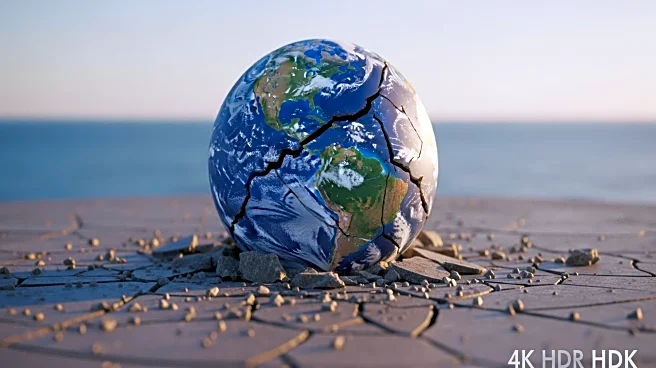What is the story about?
What's Happening?
A magnitude 6.9 earthquake struck the northern coast of Cebu in the central Philippines on September 30, causing widespread destruction and displacing thousands. The earthquake resulted in at least 68 fatalities and over 500 injuries as buildings, homes, and churches collapsed. The disaster has left many survivors, including Arguel Estalicas, a tourism officer, too frightened to return to their homes, forcing them to live in temporary shelters such as tents. The earthquake has also disrupted daily life, with roads cracked and essential services like power and communication lines affected. The Philippine military has been deployed to assist in maintaining order and facilitating relief efforts.
Why It's Important?
The earthquake in Cebu highlights the vulnerability of the Philippines to natural disasters, given its location on the 'Ring of Fire,' a region prone to earthquakes and volcanic activity. The immediate impact includes significant loss of life, injuries, and displacement of nearly 80,000 people. The disaster underscores the need for robust disaster preparedness and response strategies in the region. The economic implications are also significant, as Cebu is a major trading and transportation hub, and the disruption could affect local and regional economies. The event calls attention to the importance of infrastructure resilience and emergency response capabilities in disaster-prone areas.
What's Next?
Efforts are underway to deliver food, restore power, and clear debris from roads. The Philippine government and military are working to ensure the safety and well-being of affected residents. Relief operations are expected to continue as authorities address the urgent need for daily necessities like food, water, and fuel. The long-term recovery process will involve rebuilding infrastructure and providing support to displaced families. International aid and support may be sought to assist in the recovery efforts, and there may be increased focus on improving disaster preparedness and infrastructure resilience in the region.
Beyond the Headlines
The earthquake has transformed vibrant communities into ghost towns, highlighting the psychological impact on survivors who are grappling with the trauma of the event. The cultural heritage of the region, including centuries-old churches, has been affected, raising concerns about the preservation of historical sites. The disaster may prompt discussions on the ethical responsibilities of governments and international organizations in providing aid and support to disaster-stricken areas. Additionally, the event could lead to increased awareness and advocacy for climate change adaptation and disaster risk reduction strategies.















